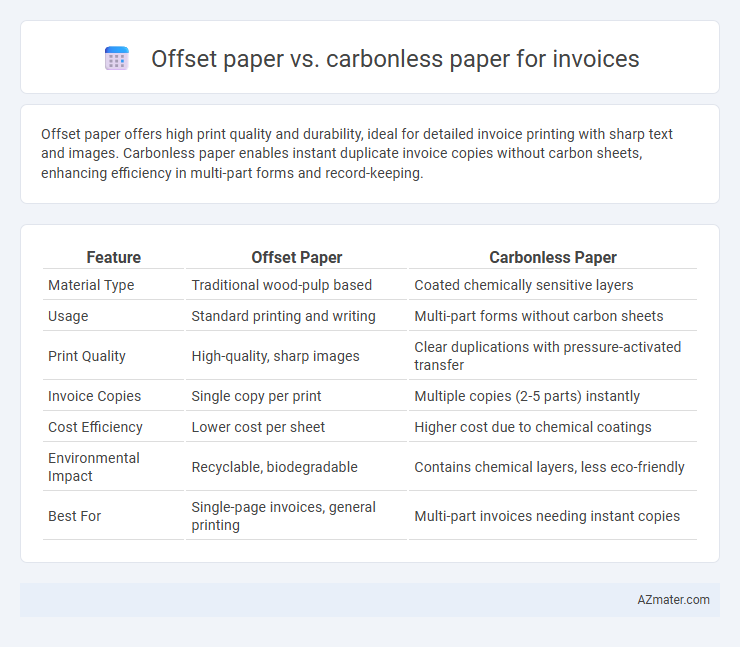Offset paper offers high print quality and durability, ideal for detailed invoice printing with sharp text and images. Carbonless paper enables instant duplicate invoice copies without carbon sheets, enhancing efficiency in multi-part forms and record-keeping.
Table of Comparison
| Feature | Offset Paper | Carbonless Paper |
|---|---|---|
| Material Type | Traditional wood-pulp based | Coated chemically sensitive layers |
| Usage | Standard printing and writing | Multi-part forms without carbon sheets |
| Print Quality | High-quality, sharp images | Clear duplications with pressure-activated transfer |
| Invoice Copies | Single copy per print | Multiple copies (2-5 parts) instantly |
| Cost Efficiency | Lower cost per sheet | Higher cost due to chemical coatings |
| Environmental Impact | Recyclable, biodegradable | Contains chemical layers, less eco-friendly |
| Best For | Single-page invoices, general printing | Multi-part invoices needing instant copies |
Introduction to Invoice Paper Types
Offset paper offers a smooth surface ideal for high-quality printing, making it a popular choice for professional invoices requiring crisp text and vibrant colors. Carbonless paper eliminates the need for carbon sheets by transferring written or printed information through micro-encapsulated dye, perfect for creating multiple invoice copies instantly. Both types cater to different business needs, with offset paper favored for single-copy invoices and carbonless paper essential for multi-part forms ensuring efficient record-keeping.
What is Offset Paper?
Offset paper is a high-quality, smooth-surfaced paper commonly used in printing invoices due to its excellent ink absorption and sharp image reproduction. It is designed for offset printing processes, which provide precise and consistent print results, making it ideal for professional invoicing. Unlike carbonless paper, offset paper requires separate sheets or carbon copies to duplicate invoiced information.
What is Carbonless Paper?
Carbonless paper, also known as NCR (No Carbon Required) paper, is specially coated to transfer written or typed information onto multiple sheets without using carbon sheets. It is commonly used for creating duplicate invoices, receipts, and order forms, ensuring clear, instant copies with minimal mess. Offset paper, on the other hand, is a high-quality, uncoated paper typically used for printing detailed invoices and documents where sharp print and durability are essential.
Key Differences Between Offset and Carbonless Paper
Offset paper offers superior print quality and durability due to its uncoated, smooth surface ideal for high-resolution inkjet or laser printing, while carbonless paper is chemically treated to transfer writing through layers without ink, used primarily for multi-part invoices. Offset paper is more cost-effective for large volume single-copy printing, whereas carbonless paper enables instant duplicate or triplicate invoice copies without carbon sheets, enhancing convenience in recording transactions. The choice depends on the need for high-quality prints versus multi-copy functionality in invoicing processes.
Print Quality Comparison
Offset paper offers superior print quality for invoices due to its smooth surface and consistent absorbency, resulting in sharp, clear text and vibrant colors. Carbonless paper is designed for instant duplication but often sacrifices print clarity, producing slightly blurred or faint images because of chemical coatings that interfere with ink absorption. For high-quality, professional-looking invoices, offset paper remains the preferred choice, particularly when detailed graphics or fine fonts are required.
Cost Considerations
Offset paper generally offers a lower cost per sheet, making it more economical for high-volume invoice printing when using traditional ink-based printers. Carbonless paper, while slightly more expensive per sheet, eliminates the need for separate carbon sheets and reduces labor costs by producing instant duplicates, which can offset the higher material cost in multi-part invoice forms. Businesses must balance initial material expenses with efficiency gains, especially when deciding between single-copy offset prints and multi-copy carbonless invoices for cost-effective document handling.
Environmental Impact
Offset paper, commonly used for invoices, is made from wood pulp and often involves chemical treatments and bleaching processes that contribute to deforestation and water pollution. Carbonless paper contains micro-encapsulated dyes which can introduce toxic substances into the environment during disposal, but it reduces waste by eliminating the need for carbon sheets. Choosing recycled offset paper or certified eco-friendly carbonless paper can significantly minimize the environmental footprint associated with invoice printing.
Durability and Usability for Invoices
Offset paper offers high durability with a smooth surface ideal for printing clear, long-lasting invoices resistant to smudging and fading, making it suitable for records requiring extended retention. Carbonless paper provides the unique advantage of creating instant duplicate copies without the need for carbon sheets, enhancing usability for multi-part invoice documentation but typically has lower durability compared to offset paper. For invoices requiring both durability and multiple copies, combining offset paper for originals and carbonless paper for duplicates ensures optimal performance and user convenience.
Best Applications for Each Paper Type
Offset paper is ideal for high-quality printed invoices requiring sharp text and vibrant colors, commonly used in professional settings such as corporate billing and detailed financial reports. Carbonless paper excels in producing instant duplicate or triplicate invoice copies without the need for carbon sheets, making it perfect for on-the-go transactions, retail environments, and service industries that require quick and efficient record-keeping. Choosing offset paper ensures superior print durability and clarity, while carbonless paper offers practical multi-copy functionality for immediate distribution.
Choosing the Right Paper for Your Invoices
Offset paper offers a smooth, high-quality surface ideal for professional invoices needing sharp, detailed printing, while carbonless paper enables instant duplicate copies without messy carbon sheets, perfect for multi-part invoice sets. Selecting the right paper depends on the invoice volume, the need for duplicates, and the printing technology used; offset paper suits traditional printing methods requiring a premium finish, whereas carbonless paper is efficient for on-the-spot copy creation. Consider durability, cost-effectiveness, and the specific invoicing process to optimize your paperwork workflow.

Infographic: Offset paper vs Carbonless paper for Invoice
 azmater.com
azmater.com